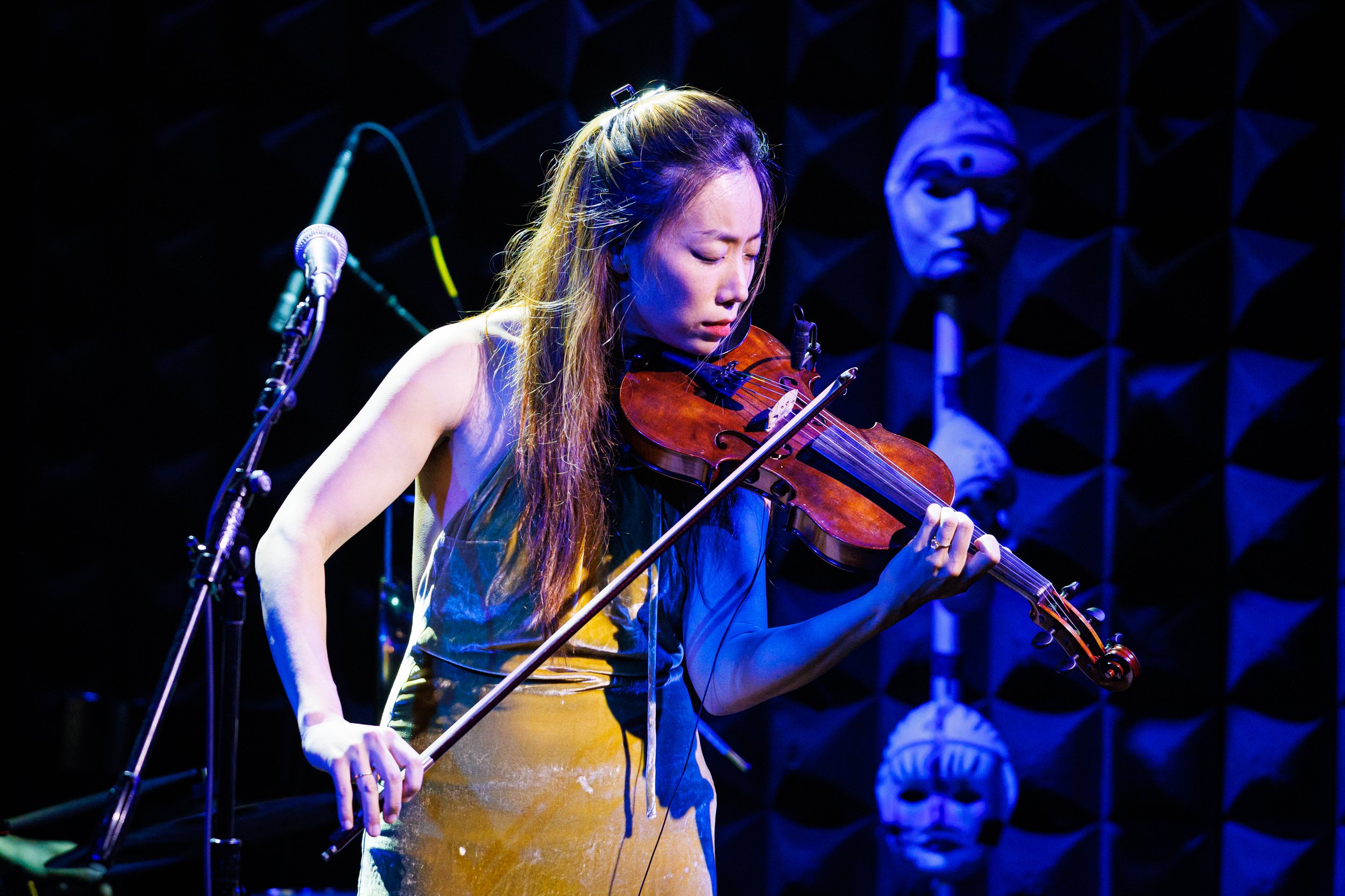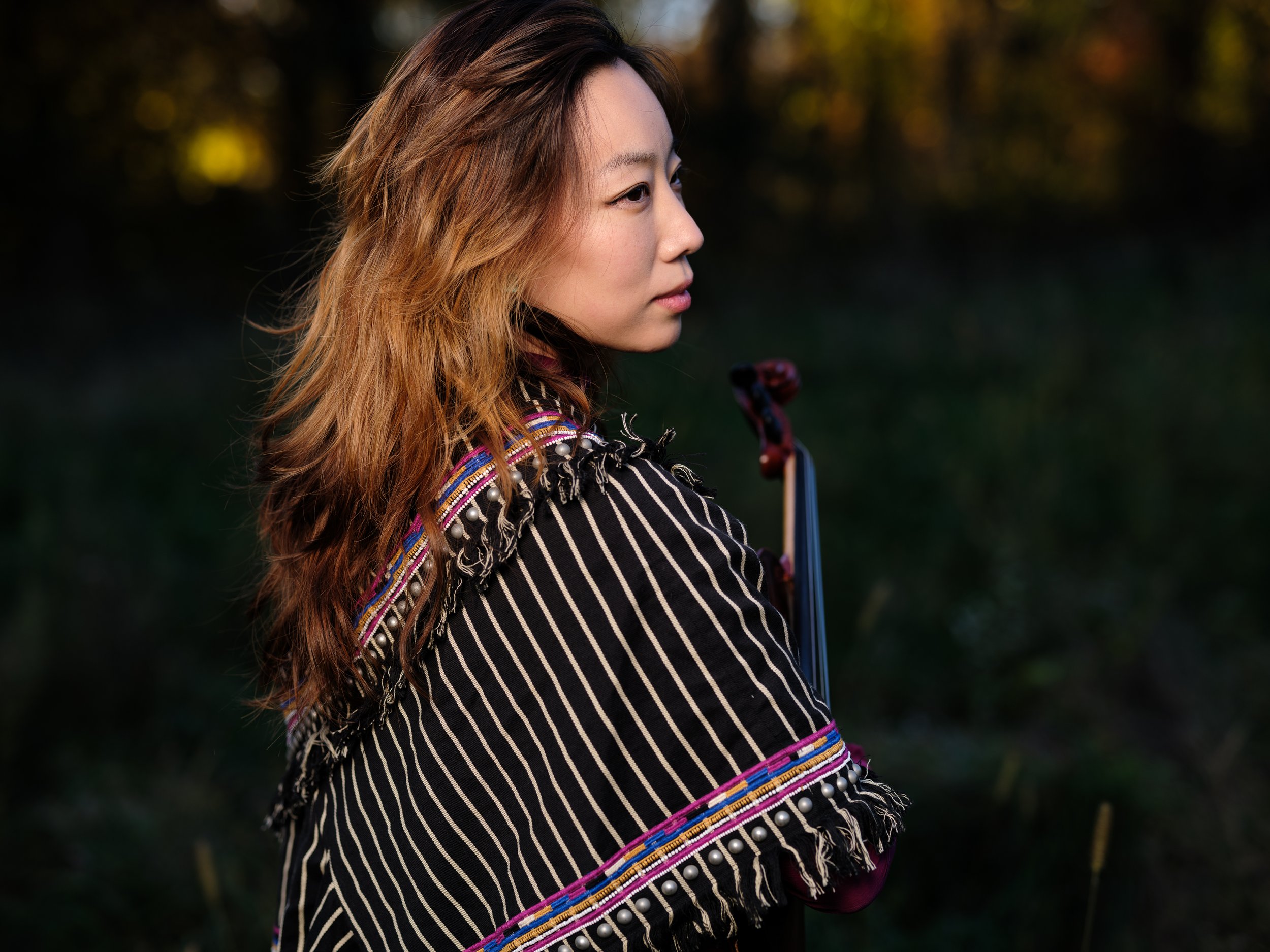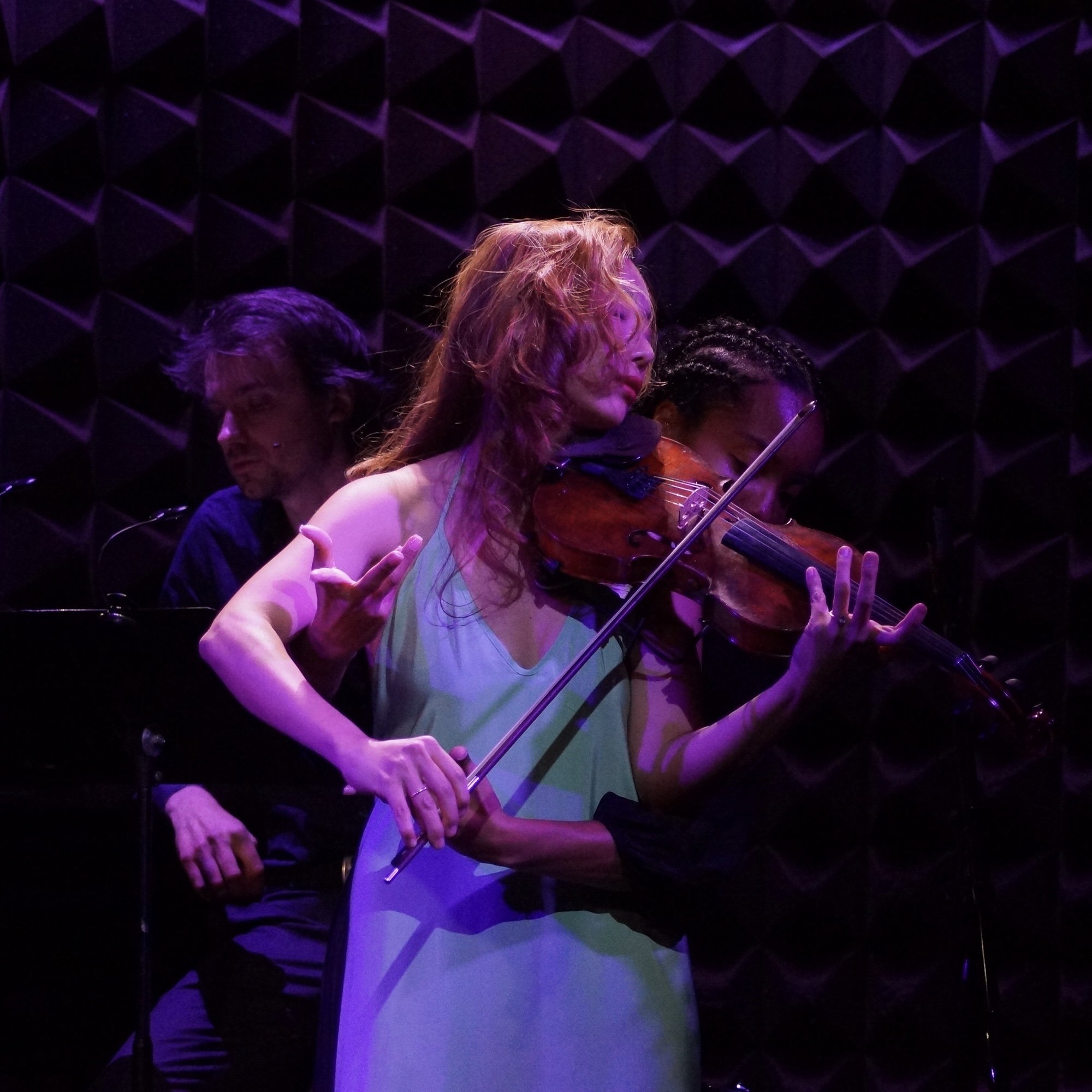Sita Chay
Artist Statement
How did you get started in your artistic journey?
When I was 4, I was obsessed with becoming a princess. And this is an interesting journey for me, because I grew up in Korea. And even already at the time, I kind of had like my idea of princess' had to do with the typical Western cultural-based kind of story of a princess. And at some point, I realized, okay, you can't become a princess as it'll be very difficult, because you have to marry a princess, or a prince. So I was kind of like, okay, I don't know what else. Because the adults kept asking, oh, what do you want to become? And I was taking violin lessons, and my mom at some point showed me on TV, oh, that's what violinists do. And she looked like a princess. So I was like, okay, I'm going to become a violinist. Since, it was like the most realistic version of a princess.
And I guess because I kept saying that, my parents arranged for me to audition for a conservatory school, and that is where I began taking music seriously. During this period, I was in a realm of Western classical music pursuing that career until I graduated college in New York. However, when I was 20, I began searching what it means to be a musician, as well as what it means to be an artist. During this time I was really delving into biographies of great musicians whom I really admired, like Mozart, Beethoven, Bach, Brahms, and more. This is where I noticed that their music was heavily influenced by folk music of many countries like Turkey, Romania, or gypsy music, and Jewish music. So I realized, oh, even among classical music, that's what I'm really attracted to. And I could kind of tell that they could improvise themselves. They expected musicians to improvise. They performed, they wrote music. So I realized, oh, they were really multifaceted, and they were open to being influenced by non-classical music. So I started to feel more open and comfortable improvising.
I had a bunch of journeys of saying yes to a lot of things, because in New York, I mean, to survive as a musician financially, in New York, the living cost is so high, like in London, everyone says yes to everything. And I said yes to mariachi music, which is Mexican; traditionally male traditional music. And I didn't know what it was. I had no job, as I wasn't busy as a musician. But, when I said yes to this gig, it turned out to be an all female, groundbreaking, diverse band. And they did pretty well. We got the Latin Grammy! So at that time, I was wondering, oh, I got the Latin Grammy, but how much do I actually know about Latin music? And like, do I really deserve it? Like, you know, I was reassessing my life. And so that led me to revisit my Korean traditional music background, which was just a few years before that, when I had a visa issue in Korea. I studied Korean traditional music, because I was kind of stuck in Korea.
Describe how your art reflects your artistic journey.
I actually did some work, like a project around my identity during my artistic journey and I'm actually hoping to do more!
I first resonated with my identity in my artistic journey with a poem I wrote, called Mirror in the Mirror, where I was just so fascinated by how we see Korea, Japan, America, all these countries with boundaries. Like there is some kind of set container that calls those people. But right around there is a country neighboring with another country. They interact just by nature. And nowadays, because of all this global access, we are interacting so fast. We see K-pop kind of mirroring Western pop culture. It's not necessarily what we used to have traditionally. So I'm just really fascinated by how we are constantly and almost like at a really, really fast pace interacting and influencing one another. And my image is reflecting something of the Western image and something of Korean. And so there is so much blending in cultures. So it's kind of like finding my own journey of what it means to be Korean or East Asian in the country of America? So now I don't live in Korea anymore, but there is the sense of identity that is going back to Korea. But there is also a sense of self that is open and interactive with what has been going on in this land. So, you know, it's an evolving thing because I'm living here longer and longer as the time goes. And I'm not sure where I'll be in the next few years. But, yeah, so that's how I see myself.
How did you develop your creative journey?
It kind of overlaps with what I was saying earlier. But I guess at first it was my attempt. I was part of this movement in Korea, which I think is still happening, of trying to westernize. It sort of symbolizes something about what we aspired to because there was some kind of a generational trauma around, having been invaded by Japan, which was like the first time and it has something to do with westernizing, like having the Western weapon. And we didn't have it because in a way, Korea was very successful in keeping them out. And in return, they got invaded by Japan who had Western weapons before us. So I think after that there was the Korean War, which was with North Korea, America and Russia. So eventually, they were like, OK, we need to westernize ASAP. So I realize perhaps because of that, my generation or my parents' generation, they think everything around that value is higher. A superior thing to achieve, like a building. A big building; a tall building of technology, like Samsung. I think when they were so occupied with that, they didn't have time to really digest what it means for them as a Korean. Like Korean traditional music, it was not appreciated for a very long time until now since the war. So they believed that Western music's better, more sophisticated. But, you know, even Korean traditional music, they stage it in a way that works better acoustically for Western music, because they kind of modeled it after Western theater. Now it's kind of coming back, but I think even for me, it took me all of my early 20's to even realize that influence on me because it was just the air that I was breathing. That was the default of thinking that to westernize is believing that it is a better, better thing. And as an extent of that, I came to America because I thought Korea wasn't good enough for me. And there was just so much of that. So that was kind of embedded in my music. And then when I kind of graduated from classical music; not that I don't like classical music. I really love it so much. I was so curious about so many other music, so many other tonalities that are not a Western European classical. And I would hear so many people when they hear those songs think that they're like out of tune, because the standard is the piano tuning, the well-tempered tuning.
So I know it's like a trend to say decolonizing, and I am not really up to date on what's going on with this movement. But it does. I do realize that there is. I'm undoing something. I'm unlearning certain things or unlayering certain things. And then my music. As part of my growth, which is just that doing something for so long becomes your language and your way of learning or my way of learning. So it happened that music was my teacher in a spiritual way and around politics or cultural blending. That led me to realize, oh, so there was all of that in my upbringing. And what am I interested in now? So I got into Indian music, Arabic music, klezmer music, Mexican music, Korean music. Which I mentioned as the latest thing, because it took me on a journey of appreciating other things. To gain confidence that, oh, wow, I'm appreciating other people's traditions, even though I've never been to Turkey or like an Arabic country or I hadn't been to Mexico at the time. But I felt like I really understood them and I felt so connected to them. And then finally it occurred to me, oh, maybe people will also. As I do, because I think at first I felt like it's such a particular thing. They're not going to connect. So then I started to really delve into it, not just because I'm Korean, but because I had access to it. And I felt like when you have something beautiful, you do have some responsibility to share that beauty with the world. And I was getting enriched by so many other people's cultures. So I was getting into that. But because I'm a violinist, I'm not a traditional Korean instrumentalist. My way of finding ways to play Korean music had to be something authentic to me. Someone who studied a Western instrument, learning the language of Korea. So it just turned out to be kind of an avant-garde and contemporary music genre. I never also ever liked to play avant-garde contemporary music, but that's where I ended up. And I guess now I just really love inviting everything that's influencing my personal life so that I can be really myself.
In addition, my husband is a psychotherapist and I have a baby. She's three and a half and I'm a mom before anything else. I'm really happy to say that. And like my husband said, it is like getting a chance to be reborn because we get to think from a perspective of the beginning of life. So that just influences so much of my music. So I'm very interested in combining psychotherapy practice into music that helps people to really kind of lead into transformative action. So I'm really interested in bridging practices because I think the beauty of art has so much to do with abstract nature. And we get changed. We get transformed by, I think, performing arts and fine arts and many kinds of forms of art. But we're not necessarily conscious of what that transformation is. And I also really appreciate psychotherapy where there is some kind of translation from what was subconscious into a cognitive area where it changes the life a little bit more concretely. So I really want to combine those two similarities in a way that there is spirituality. But I just imagine there would be such a big synergy when one can really feel freely the experience of, you know, through the sound of music and dance and visual arts. And when one is feeling really open, it really feels like everything is possible.
If there is some connection to some cognitive understanding about why are we having such difficulty addressing environmental issues? Why can I not turn vegan like this? Even though I know it's a good thing. That's my personal life. And, you know, I think there's just so much psychological barrier, like, you know, feeling overwhelmed or feeling like, oh, but I'm going to lose something or it's going to be hard to cook all of a sudden a new recipe. Like, you know, it's just so many psychological things that keeps us from actually changing the world in a way that is positive and gentle. Like without, a lot of movements can be sometimes very judgmental and harsh. Like, oh, we're bad. We've been doing bad things to the earth. So now we need to do good. And that doesn't really give us a sense of love and help us to connect with our ability to love ourselves and accept ourselves for the whole. So those are the things I learned from psychotherapy through my husband. So, yeah, I'm really passionate about connecting those on many, many matters, which I think is all interlocking. I think so many things are connected, like gender issues, racism or any of that. It's so. It's not just like something put in a box.
What is one piece of creative advice you would like to share?
I feel a little cautious about giving advice. But if I were to share something that was helpful for me, there would be a couple of things I realized. And I do tell people if they want to know. I think the biggest thing is love. And being guided by love rather than fear is so much more joyful and more opening. And it opens more doors. That's very simple. And I think from that message, one of the things that I learned was what I felt like, for example, helping other people was only possible if I achieve a certain thing, if I'm at a certain level. Then only then I have something to share or something to give away or, at least be in the mindset of giving. And I just kind of accidentally stumbled into, like, volunteer work playing for homeless people. It's called a Soup Kitchen in America. They have this gathering. They offer food and people eat there and they listen to music. And I would say because of that mindset where people think volunteering is something you do in a certain position, you actually get to connect with so many people who are in a leadership position. It's really a win-win thing because then you get to be in a place of realizing what I can give. And that is just empowering just by itself. It just connects me to my really innate self-confidence, not a super conditional kind of confidence, which I think can be just taken away if you fail and your confidence is gone. But realizing, oh, there's something that I can offer and these people are in need of that. So, I believe people can do volunteer work at any stage of their career, and can be just as empowering, and great for connection. Like a real connection!
And another thing I loved learning during my career was to really follow your heart. It helped me to realise who I am, and what I consist of. My talent. I think what people didn't really tell me when I was growing up was that talent was one solid thing. "You're talented in violin", "You're like #1 in violin", therefore you will become a violinist. I realised it wasn't like this at all. You have a percentage of talent, like I am only 20% good at social situations, then I'm 30% adaptable to different genres, as well as 10% good at being professional; being on time; reliable. All of these things become a little bit clearer when I follow my heart, because being attracted to something has a lead way to realising my talent. As I realise I'm good at this! And I'm really enjoying this! or people do seem to appreciate this. So, I realised the unique combination of my talents led me to where I'm at now, which continuously is driving me forward to do so many other projects.
About
Sita Chay is a violinist, composer, and a performance artist who won a 2017 Latin Grammy Award for Best Mariachi Album, as violinist of the Flor de Toloache. She is an awardee of New York Foundation for the Arts Women's Fund, NYSCA/NYFA Artist Fellowship, New Music USA’s Creator Development Fund, Lower Manhattan Cultural Council’s Creative Engagement Grant, and Foundation for Contemporary Arts, and was invited for residencies at the Stone, Joe’s Pub, and the Cell Theatre for various projects she is envisioning. Her collaborators include Satoshi Takeishi, Shoko Nagai, Sidra Bell, and Leo Genovese and with them she performed in numerous festivals such as
Progressive Chamber Music Festival 2023 and Outfest 2024, and Multicultural Music Festival 2024.
Her most recent project “Multidimensionally Human” is an interdisciplinary series collaborating with Dr. Nikolai Chapochnikov, neuroscientist, and psychotherapist. Through this project, she is exploring psychotherapy modality Internal Family Systems using narrative, dance, visual art, and music.
In 2023, she released a music narrative film “Ritual of Le Sac," which tells a story of a fish-like life of a baby swimming inside the womb. This project was inspired by
her recent journey of becoming a mom and experiencing the kindness and gentle curiosity from various strangers on the street for carrying a life inside. She
intended this film to reflect and rediscover innate human capacity and desire to care and honor life.
Ms. Chay is the director and a founder of the Korean Shaman Music Ritual, SaaWee, which was received by international critics as a “delicate powerhouse”. For SaaWee, she has interwoven her theatrical experiences from Broadway shows, folkloric spirituality from Korean shaman rituals, and contemporary music flare from New York jazz scenes. SaaWee's Return of Songbirds debuted at the Lincoln Center as part of #Restartstage project in 2021 and was invited to Ars Electronica Festival 2021. SaaWee won the California Music Video Awards 2022 in Best World Music category.
Contact
Instagram: @sitachay
Website: sitachay.com



